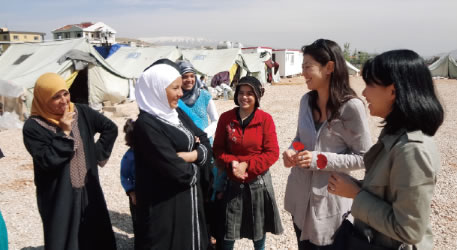Stories from the Field 05
Providing a Place to Learn for
the Youth of Syria and Lebanon
– Seeking to promote mutual understanding between refugees
and host communities

Ms. Mana Nagashima (second from right) talks to Syrian refugee youths in the Beqaa Informal Tented Settlement in Lebanon. (Photo: Save the Children Japan)
Lebanon is a small country of approximately 4 million people, sharing borders with Syria and Israel. Currently Lebanon is home to more than 1 million Syrian refugees, who fled from the conflict in their native country. It is estimated that there are approximately 1.5 million refugees in Lebanon, if including those refugees who are not registered with the United Nations. This means that it hosts the highest proportion of refugees in the world on a per capita basis.
However, Lebanon itself is experiencing economic stagnation and the inflows of Syrian refugees could take away opportunities for local employment. This has led to fears among some that the situation could destabilize communities and domestic security. Due to the differences in dialect and living environments, there is very little interaction between Syrian refugee communities in Lebanon and Lebanese host communities.
This situation particularly affects young Syrian refugees who have few opportunities for education or employment, and have become isolated from host opportunities. In order to ensure that young Syrian refugees can get a stable way of life and play a role in local communities, it is necessary to increase opportunities for education and employment, and also promote mutual understanding with the people of Lebanon.
Since April 2013 Public Interest Incorporated Association “Save the Children Japan” has been working to implement the Project to Assist Young Syrian Refugees in Lebanon, with funding provided through the Japan Platform (JPF).1 This project targets young people aged 14 to 24, including both Syrian refugees and members of host communities in Lebanon. Six youth centers have been established in Bekaa Governorate, which shares a border with Syria, and also in the capital Beirut. These centers provide training and practical learning opportunities for young people to cultivate communication, leadership and teamwork, and also to encourage them to develop methods of critical thinking that enable them to perceive all things objectively and from multiple perspectives so as to promote understanding that is logical rather than emotional. Although these young people have become decoupled from society, the project not only provides them with life skills for their daily lives, but also aims to promote community participation by young Syrian refugees.
After completing training at the youth centers, young Syrian refugees and Lebanese form joint groups together and engage in various activities. These include organizing recreational and learning activities for children at the refugee camps, providing adult literacy classes, health and hygiene awareness activities, and maintenance of sports grounds and parks to contribute to the local community. By working together in these activities, not only do the young Syrian refugees and Lebanese people deepen their own mutual understanding, but they also become accepted by local residents, which significantly boosts their self-confidence.
“At each of the youth centers, ‘youth facilitators’ to be chosen from the refugees and host communities become leaders for young people in the community. Our basic policy is to provide training and venues for activities so that these facilitators can enhance their leadership skills and implement activities independently.” These are the words of Ms. Mana Nagashima, the project manager who has been providing assistance in Lebanon since the start of the project.
Ms. Nagashima adds, “At first the host communities were wary about the project as they thought it would only provide assistance to Syrian refugees. However, once they realized that the project aimed to assist both refugees and the Lebanese community they were very cooperative. When the project first started, the young Syrian and Lebanese people were initially very awkward around each other. However, I see now how they have naturally become friends by conducting activities together and I get a real sense of the outcomes of this project.”
Many of the people who have graduated from the youth centers are already active in society. One of these is Ms. Zeina, a Lebanese woman who first worked as a youth facilitator and as the next step become a local staff member for Save the Children. Ms. Zeina talks about how her experiences at the youth center changed her, saying, “I once thought that the Syrian refugees were an economic burden for our village and the cause of social instability. However, by participating in the center’s activities, I realized that many of the refugees are extremely talented. Now I feel really motivated to help them lead more secure and stable lives in Lebanese society.”
Through the project’s activities to date, there has been some progress in promoting interaction and mutual understanding between Syrian refugees and Lebanese people in host communities; however, there is still no end in sight to the conflict in Syria and many refugees are still facing hardship and an uncertain future. Says Ms. Nagashima, “Although there are some concerns about how long we can continue our assistance activities with our funding, I hope that we can keep the project going for as long as possible, so that these young people do not become a ‘lost generation’ without access to education and employment.”
Support for people who have escaped from conflict and for the host communities to ensure their peace and stability and safety is extremely important. The work for Save the Children Japan is responding directly to such needs.
*1 JPF is an organization launched by NGOs, business communities, and the Government of Japan in August 2000 in order for Japanese NGOs to carry out expedient and effective emergency humanitarian assistance in response to conflict or natural disasters.
<< Previous Page Next Page >>
Main Text | Statistics and Reference Materials | Stories from the Field | Master Techniques from Japan to the World | ODA Topics
